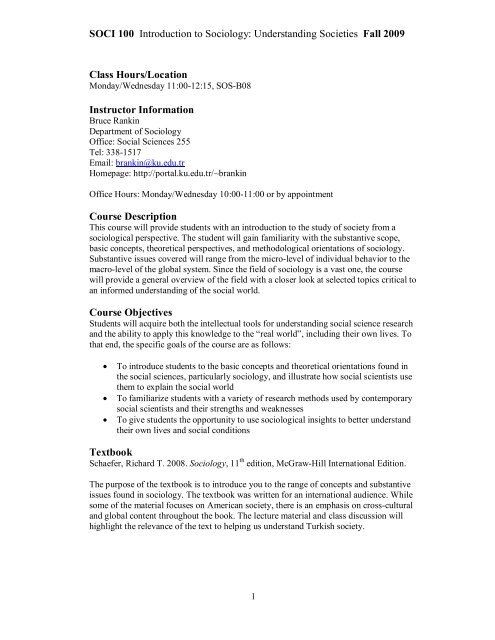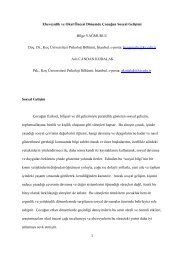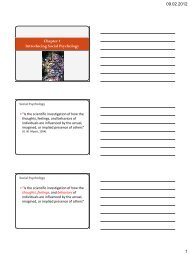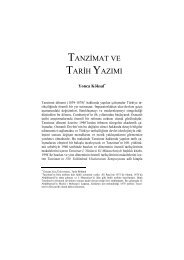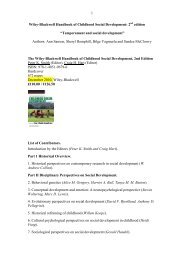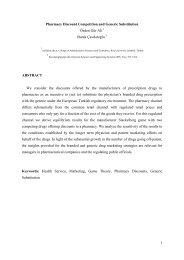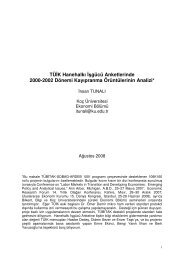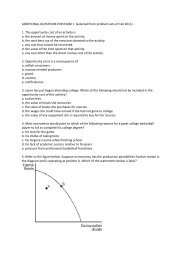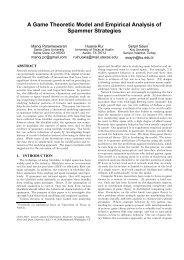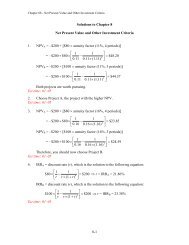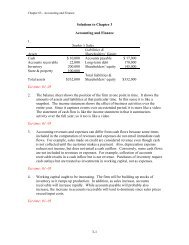SOCI 100 Introduction to Sociology: Understanding ... - KUAIS
SOCI 100 Introduction to Sociology: Understanding ... - KUAIS
SOCI 100 Introduction to Sociology: Understanding ... - KUAIS
You also want an ePaper? Increase the reach of your titles
YUMPU automatically turns print PDFs into web optimized ePapers that Google loves.
<strong>SOCI</strong> <strong>100</strong> <strong>Introduction</strong> <strong>to</strong> <strong>Sociology</strong>: <strong>Understanding</strong> Societies Fall 2009Class Hours/LocationMonday/Wednesday 11:00-12:15, SOS-B08Instruc<strong>to</strong>r InformationBruce RankinDepartment of <strong>Sociology</strong>Office: Social Sciences 255Tel: 338-1517Email: brankin@ku.edu.trHomepage: http://portal.ku.edu.tr/~brankinOffice Hours: Monday/Wednesday 10:00-11:00 or by appointmentCourse DescriptionThis course will provide students with an introduction <strong>to</strong> the study of society from asociological perspective. The student will gain familiarity with the substantive scope,basic concepts, theoretical perspectives, and methodological orientations of sociology.Substantive issues covered will range from the micro-level of individual behavior <strong>to</strong> themacro-level of the global system. Since the field of sociology is a vast one, the coursewill provide a general overview of the field with a closer look at selected <strong>to</strong>pics critical <strong>to</strong>an informed understanding of the social world.Course ObjectivesStudents will acquire both the intellectual <strong>to</strong>ols for understanding social science researchand the ability <strong>to</strong> apply this knowledge <strong>to</strong> the “real world”, including their own lives. Tothat end, the specific goals of the course are as follows:To introduce students <strong>to</strong> the basic concepts and theoretical orientations found inthe social sciences, particularly sociology, and illustrate how social scientists usethem <strong>to</strong> explain the social worldTo familiarize students with a variety of research methods used by contemporarysocial scientists and their strengths and weaknessesTo give students the opportunity <strong>to</strong> use sociological insights <strong>to</strong> better understandtheir own lives and social conditionsTextbookSchaefer, Richard T. 2008. <strong>Sociology</strong>, 11 th edition, McGraw-Hill International Edition.The purpose of the textbook is <strong>to</strong> introduce you <strong>to</strong> the range of concepts and substantiveissues found in sociology. The textbook was written for an international audience. Whilesome of the material focuses on American society, there is an emphasis on cross-culturaland global content throughout the book. The lecture material and class discussion willhighlight the relevance of the text <strong>to</strong> helping us understand Turkish society.1
<strong>SOCI</strong> <strong>100</strong> <strong>Introduction</strong> <strong>to</strong> <strong>Sociology</strong>: <strong>Understanding</strong> Societies Fall 2009Course RequirementsStudents are expected <strong>to</strong> attend class and <strong>to</strong> participate in class discussions and arerequired <strong>to</strong> take two midterms and a final exam. Class attendance is particularlyimportant because lectures will include material not covered in the text. Students arestrongly encouraged <strong>to</strong> come <strong>to</strong> class having completed the assigned reading for thatweek and prepared <strong>to</strong> discuss the material. As an additional incentive <strong>to</strong> do so, there willbe several pop quizzes during the semester based on material covered in the textbook.Students must be on time for class and remain in their seats throughout the class. Cellphones should be turned off and put away before entering the classroom. Chatting,reading newspapers, sleeping, and other disruptive and/or disrespectful behavior will notbe <strong>to</strong>lerated and can result in disciplinary action.GradingStudents will be evaluated on their class participation and their scores on pop quizzes,two midterm exams and the final exam. Note that there will be no chance <strong>to</strong> earn “extracredit”. Exams will be in a multiple choice format and will cover material presented inclass and from assigned textbook readings. The final exam will not be comprehensive.No make-up exams will be allowed unless an unambiguous medical report is presented.The final grade will weighted as follows:10% in-class exercises and class participation30% first midterm exam30% second midterm exam30% final examThe final grade scale will be:90-<strong>100</strong> = A 70-72 = C87-89 = A- 67-69 = C-83-86 = B+ 64-66 = D+80-82 = B 60-63 = D77-79 = B- 0-59 = F73-76 = C+NOTE: Please make sure that you are familiar with the University AcademicRegulations and the Regulations for Student Disciplinary Matters, particularly thoserelated <strong>to</strong> academic honesty. Cheating, plagiarism, and collusion are serious offensesresulting in an F grade and disciplinary action.How <strong>to</strong> Succeed in this ClassThe best grades are usually received by those students who: Attend class regularly and take good notes Read the assigned chapters before coming <strong>to</strong> class Participate in class discussions and ask questions Attend the exam review sessions Study effectively for the exams2
<strong>SOCI</strong> <strong>100</strong> <strong>Introduction</strong> <strong>to</strong> <strong>Sociology</strong>: <strong>Understanding</strong> Societies Fall 2009Use the instruc<strong>to</strong>r’s office hours when help is neededIf you are doing all of the above and still not performing as well as you would like in thecourse, please come and see me as soon as possible.Course OutlineWeek and Dates Topics Covered Required ReadingPart 1 & 2: The Sociological Perspective & Organizing Social Life1. Sept. 28 & 30 <strong>Understanding</strong> <strong>Sociology</strong> Chap. 12. Oct. 5 & 7 Sociological Research Chap. 23. Oct. 12 & 14 Culture Chap. 34. Oct. 19 & 21 Social Interaction & Social Structure Chap. 55. Oct. 26 Groups & Organizations Chap. 6Oct. 28Cumhuriyet Bayram (no class)1 st Midterm (date <strong>to</strong> be announced)Part 3: Social Inequality6. Nov. 2 & 4 Stratification & Social Mobility Chap. 97. Nov. 9 & 11 Global Inequality Chap. 108. Nov. 16 & 18 Race & Ethnicity Chap. 119. Nov. 23 & 25 Gender Chap. 1210. Nov. 30 Kurban Bayram (no class)Dec. 2Gender (cont.)2 nd Midterm (date <strong>to</strong> be announced)Part 4 & 5: Social Institutions and Social Change11. Dec. 7 & 9 The Family & Other Intimates Chap. 1412. Dec. 14 & 16 Religion Chap. 1513. Dec. 21 & 23 Economy & Work Chap. 1814. Dec. 28 & 30 Population & Environment Chap. 2115. Jan. 4 & 6 Globalization, Technology & Social Chap. 23ChangeFinal Exams: Jan. 12-22 Final Exam (date <strong>to</strong> be announced)This syllabus is also available on <strong>KUAIS</strong> courseware and my homepage(http://portal.ku.edu.tr/~brankin).3


